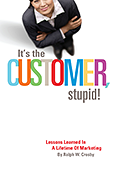Consistency Helps Build Loyalty
Some marketers confuse a brand with a brand identity. Brand identity is the design-driven process that helps an organization develop a name, graphic, logo, colors, and design standards and gives the brand a unique personality. When this identity becomes widely known (think Nike’s “swoosh”) it differentiates the product or organization and creates value in the marketplace. But it’s not the brand; it is only a representation of the brand.
A brand itself is intangible. It exists in the mind of a customer as a pattern of feelings, associations and ideas – the brand’s attributes that customer has come to value through experience. It represents your promises to the customer. To give the brand credibility and appeal, the promises it represents must provide evidence that the organization is unique in a way that is meaningful and beneficial to the customer.
In exchange for that value, customers give their loyalty to the organization, its products or services. It demands a special relationship, or bonding, with the customer, one that satisfies the customer’s wants or needs, practical or emotional. The value of this loyalty between customer and organization is called “brand equity.” It is the monetary or activity result of having customers who are committed to the brand, and they often are willing to pay more, give more, or advocate more for it.
Consistency – Key to Brand Building
Brand loyalty requires repeated, consistent performance. Consistency with the customer is essential in building your brand.
- The quality of your offering must remain consistent. As Peter Drucker, known as the father of modern management, admonished:
“Quality in a product or service is not what the supplier puts in. It is what the customer gets out and is willing to pay for. Customers pay only for what is of use to them and gives them value. Nothing else constitutes quality.”
- Communications to the customer must be meaningful and consistent. Audiences today, bombarded by offline and online messages, have become resistant to some communications. Consistent representation of your brand is the key to remembrance, as noted psychologist Jarol B. Manheim wrote in his book The Politics Within:
“One way to increase the probability that this unconsciously received information will have some impact is to give it thematic consistency. That is, even though such messages may travel at different times over different media, they should possess a certain identifiable similarity with respect to both their substantive content and their format.”
- Brand-building requires consistent positive contact with the customer. Personal relationships with customers will give you a competitive edge, but brand-building requires even more. You must concern your organization with the total customer experience, especially in the online marketing age in which the customer can choose to listen to your brand messages. So, whatever channels you use to contact the customer, e.g., online or offline media, in-store or in-person, your organization should be positive and consistent in satisfying the customer.
Remember our definition of customers – “Those whose satisfaction is key to the organization’s success.” Customers are the only things that really create value for your organization, so their loyalty is critical. The results of such loyalty are 1) repeat business with lower cost of sales than the expense of marketing for new customers; 2) unpaid ambassadors spreading your brand message; and 3) an ongoing value of the customer over the lifetime of your relationship.

 Businesses often are started by entrepreneurs with an idea, a product or service, or an expertise. Many of them fail, not because the idea or product isn’t good, but because their attention is overwhelmingly directed internally – e.g., what goes into the product – when they should focus externally, always reminding themselves:
Businesses often are started by entrepreneurs with an idea, a product or service, or an expertise. Many of them fail, not because the idea or product isn’t good, but because their attention is overwhelmingly directed internally – e.g., what goes into the product – when they should focus externally, always reminding themselves:
